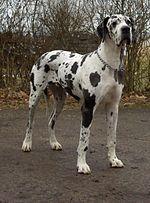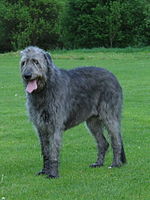A Great Dane and an Irish Wolfhound, two giant dog breeds
A giant dog breed is a breed of dog of gigantic proportions, sometimes described as a breed whose weight exceeds 45 kilograms (99 lb).[1] Breeds sometimes described as giant breeds include the Great Dane, Newfoundland, St. Bernard and Irish Wolfhound.[2] These breeds have seen a marked increase in their size since the 19th century.[2]
Dog breeds described as giants tend to have more health problems than smaller dogs and have the shortest life expectancy of all dog breeds.[3]
See also
- Selective breeding
- List of individual dogs§Dogs of unusual size
References
- ^ Glickman, Lawrence; Glickman, Nita W.; Schellenberg, Diana B.; Raghavan, Malathi; Lee, Tana (2000-11-15). "Non-dietary risk factors for gastric dilatation-volvulus in large and giant breed dogs". Journal of the American Veterinary Medical Association. American Veterinary Medical Association. 217 (10): 1492–1499. doi:10.2460/javma.2000.217.1492. PMID 11128539.
- ^ a b Galis, Frietson; Van Der Sluijs, Inke; Van Dooren, Tom J.M.; Metz, Johan A.J.; Nussbaumer, Marc (2006-06-20). "Do large dogs die young?". Journal of Experimental Zoology. Wiley-Blackwell. 308B (2): 119–126. doi:10.1002/jez.b.21116. PMID 16788896.
- ^ Mehus-Roe, Kristin (2005). "The Dog For You". The Original Dog Bible. BowTie Press. pp. 62–63. ISBN 1-931993-34-3.

